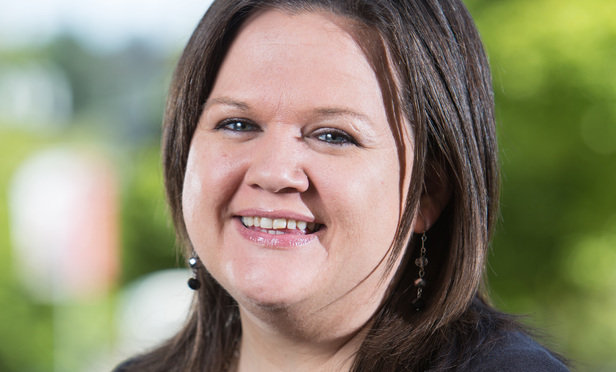 Seattle University School of Law student Tarra Simmons. (Photo: Matt Hagen)
Seattle University School of Law student Tarra Simmons. (Photo: Matt Hagen)
Convicted felon Tarra Simmons, who was recently awarded a fellowship from a foundation affiliated with Skadden, Arps, Slate, Meagher & Flom, saw her quest to practice law recently hit a hurdle when the Washington State Bar Association ruled against her bid to take the state bar exam.
Simmons, who just graduated magna cum laude from the Seattle University School of Law, enrolled in the school’s J.D. program after a 20-month prison term for drug offenses. This year she was one of 30 recipients of Skadden’s prestigious public interest law fellowship, which allows recent law school graduates to spend two years working to improve legal services for the poor. As a legal extern at the Public Defender Association, a Seattle-based nonprofit organization, she strives to help former prisoners re-enter society.
But according to Northwest Public Radio, the state bar’s character and fitness board voted 6 to 3 last month against allowing Simmons to take the bar exam. The bar’s general counsel, Jean McElroy, told the radio station that “when deciding on character and fitness, the board considers how recent and serious the misconduct was, and its cumulative nature.”
A spokeswoman for the state bar said that information related to character and fitness rulings is considered confidential, and referred an inquiry about those decisions to general requirements for admissions and practice rules.
Simmons, who told The American Lawyer in March that she became addicted to drugs after a doctor prescribed her narcotics to treat chronic pain, has spoken openly about her past legal issues. She now plans to ask the Washington Supreme Court to review the character and fitness board’s recommendation.
“I understand the bar’s concerns because I have made some serious mistakes in my past,” Simmons wrote in an email Monday. “I respect the individuals on the board and I respect the process. It is also my dream to make our communities healthy and safe. I hope to use my experiences and achievements to assist former justice-involved individuals by offering them a lawyer who has lived their experience … I pray the Washington State Supreme Court will give me this opportunity. I will value my law license and work every day to make the Court and my community proud.”
Regardless of the Washington Supreme Court’s decision, Simmons said she plans to continue to use her personal story to advocate for the removal of barriers for people with a conviction on their records.
“Since my last arrest in 2011, it has been my goal to prove that redemption is possible while offering legal assistance to my community in search of a second chance,” she wrote.
Skadden announced in early December its list of Skadden Fellows for 2017. The program, started in 1988 to mark Skadden’s 40th anniversary, has since placed hundreds of young lawyers into the public sector.
Rebecca Cohen covers the business of law from the West Coast. Contact her at [email protected]. On Twitter: rebeccatcohen




